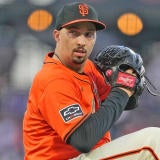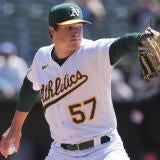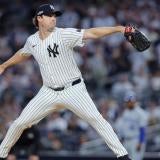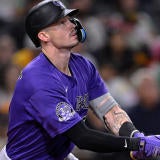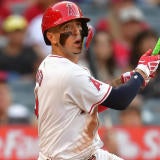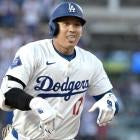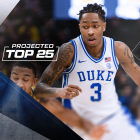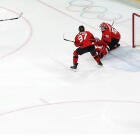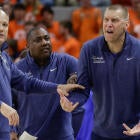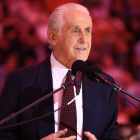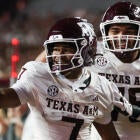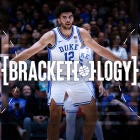Most Interesting Picks from Our First 2025 Mock Draft: Shohei Ohtani goes No. 1 but not a clear-cut choice
Find out why a second-round pick might not be high enough for Jackson Chourio

The offseason is officially here, and you know what that means: It's time to start drafting again!
"It's too soon," you might say! "We don't even know who will be playing where yet," you shout! "Please, I haven't seen my family since March," you plead.
Too bad!
Okay, well, you don't have to draft until March if you don't want to. I won't make you. Go hug your children and see how much they've grown while you were up to your elbows in waiver-wire claims and trade values charts; I won't judge! But as for me and my Fantasy Baseball Today pals? We're ready to start drafting all over again.
We've given you our first-round of 2025 rankings, as well as my way-too-early sleeper, breakout, and bust picks, and last week, we did our first mock draft of the offseason. And rest assured, we're all aware of how much things are going to change between now and next spring, when most of your drafts are going to go down.
These super-early drafts are always an interesting exercise because there is no consensus from which to draw. ADP is basically nonexistent at this point in the offseason, and the group-think that inevitably sands down some of the rough edges and outliers from our rankings hasn't had time to develop yet. In some ways, you're getting people's unfiltered views of the state of the player pool from the very earliest drafts, and there's a lot of value in knowing where our baselines stand at the start of the offseason.
Scott White wrote about our first mock draft last week, so you can check out his thoughts there, along with the full results for every team. In the rest of today's newsletter, I've highlighted the 12 most interesting picks from this first draft – a 12-team Rotisserie mock with no bench spots.
These results could look hilariously anachronistic by March, and I've highlighted a few spots where I think exactly that will happen. But we can still learn a ton about these unvarnished early picks, even knowing where there will be movement from here.
Later this week, I'll start my preview of the state of the starting pitching position for 2025 with a look at 10 of the biggest questions facing the position heading into the offseason before going in-depth with my position preview next week, followed by relief pitcher. We'll have plenty more drafts in the coming weeks and months to break down as well, and the hot stove is about to really heat up, so don't expect things to slow down on this front.
Now, let's get to our first mock draft of the offseason:
12 most interesting picks
1.1 - Shohei Ohtani, DH, Dodgers
He was the best player in Fantasy in 2024 by a mile, putting together the first 50-50 season in MLB history. It makes sense for him to be the first overall pick after a season like that, and I'm not sure I even disagree with it … but I'd have to give it some real thought to actually pull the lever for him when I have the No. 1 pick.
Ultimately, I don't think anyone expects Ohtani to repeat his 2024 production. For one thing, we've simply never seen him run nearly as much as he did in 2024, and you have to think that was by design – it's the only season since 2019 where there was no expectation that Ohtani would take the mound. And, when Ohtani isn't pitching, he tends to run a lot more often: Over parts of four seasons, he has played 379 games where he wasn't in the rotation, and he has averaged one stolen base attempt every 15.8 plate appearances; when pitching, that number rises to once every 24.4 plate appearances.
Now, it's worth noting that 2019 is carrying a lot of weight in that state – take it out, and he attempted one steal every 23.3 plate appearances in his first three stretches where he wasn't in the rotation. So, maybe the more relevant factor in 2019 was joining the Dodgers, not the fact that he wasn't pitching.
But the shoulder injury he suffered in the World Series while attempting a steal looms as both an injury red flag and a potential reason the Dodgers will be more careful about letting him run in 2025. I still think Ohtani is a candidate for the No. 1 pick even if he's just a 25-steal threat – he was No. 7 in 2023 in just 135 games while stealing 20, after all – but you can't just draft him as if 2024 is the new norm. His upside is as high as anyone's, but there are enough ways for things to go wrong that I think you can consider Bobby Witt at No. 1 instead.
2.3 - Corbin Carroll, OF, Diamondbacks
I want to highlight my own pick here, not because I think Carroll is such an obvious steal at this price, but because I think it highlights how having a pick toward the end of the first round in a 12-team league in 2025 could end up giving you an unexpected edge on the competition. I think there are probably 15 true first-round caliber players in the 2025 draft pool as things stand, and I'm really not sure there's much difference between the No. 5 pick, Gunnar Henderson, and the No. 15 one.
Henderson deserves to be ranked ahead of Carroll and will almost certainly be drafted ahead of him in all leagues based on the way their 2024 seasons went, but if you include 2023, there's not that big of a difference between the two of them in Roto:
- Henderson: .269 average, 218 R, 65 HR, 174 RBI, 31 SB
- Carroll: .257 average, 237 R, 47 HR, 150 RBI, 89 SB
And here's the thing: I got to pair Carroll with Kyle Tucker, who enjoyed a breakout in 2024 when healthy and who is clearly in that top 15 for me, while Henderson was paired with Jarren Duran, an awesome player, but one I think is a clear tier below the previous three. Given how little distinction I think there is between the first-round caliber hitters outside of the top three (or four), I think you can make a case that, if you can't get a top-three pick, you should be hoping to pick later in the first round – at least in 12-team leagues.
2.5 - Tarik Skubal, SP, Tigers
Here's where your No. 1 SP went off the board, and that's probably about right. Skubal is, I think, pretty clearly the best pitcher in baseball right now and is a viable choice as soon as that group of 15 goes off the board. Whether you want to be the first person to take a starting pitcher is, of course, up to you, but if you do, prepare to pay this price.
And, if you want to be the one to take Paul Skenes, prepare to jump quickly because he came off the board with the very next pick after Skubal. I think you can make a case for Skenes as the second pitcher off the board, but I don't think I'll be the one doing that – Zack Wheeler fell to the first pick of the third round, and I'd rather make that bet, personally. It won't always go in that exact order, but I do think if any of those top three is likely to "fall" relative to the other two in any given draft, it's going to be Wheeler.
2.11 - Jackson Chourio, OF, Brewers
Toward the end of the season, I wrote in this newsletter that "you can't rank Jackson Chourio high enough heading into 2025," and I think this is probably where he's going to end up drafted more often than not. Chourio wasn't quite worth a top-24 pick in 2024, but he wasn't far off, finishing as the No. 32 player in Roto leagues despite a relatively slow start; from June 1 on, he was the No. 17 player.
And he did that 1) As a 20-year-old who won't turn 21 until a few weeks before the 2025 season and 2) Without contributing much as a base stealer. Despite stealing 44 bases in just 128 games across the high minors in 2023 and ranking in the 97th percentile in sprint speed, Chourio attempted just 29 steals as a rookie on a team that ran a ton. You're telling me Jake Bauers could steal 13, but Chourio is only capable of 22? No, this is a guy who should steal 30-plus every year, and if the Brewers trust him enough to let him go, a second-round pick may not be high enough for him.
3.10 - Austin Riley, 3B, Braves
In 2024, Riley's ADP was 18.84, about a half-round ahead of Rafael Devers, who went nine spots ahead of Riley in this draft. I think Riley is a nice value there, seeing as I'm the one who drafted him. And if he's going to make it to the second half of the third round regularly, I'm probably going to end up drafting Riley quite a lot in 2025 because I just don't see much reason to be worried about his 2024 struggles. He got off to a slow start while dealing with an oblique injury that limited him early on, but from June 1 on, Riley hit .275/.339/.531 with a 38-homer pace – in other words, he hit like Austin Riley for most of his season. Click with confidence.
4.11 - Brent Rooker, DH, Athletics
DH/Util-only players are going to be a big topic of discussion in 2025, and not just because the likely 1.1 qualifies. Between Ohtani, Rooker, Marcell Ozuna, and Kyle Schwarber, you have four Util-only players who are, without question, must-start Fantasy options for 2025, and Joc Pederson, Giancarlo Stanton, Masataka Yoshida, J.D. Martinez and a few others could be worth starting, too, meaning that many Fantasy leagues next season will likely be using their U/DH spot on a player who isn't eligible anywhere else.
Normally, that's a big mark against a player, but I'm not so sure it should be. Flexibility is great, but it's going to be hard to avoid a Util-only player in your lineup in 2025, and so you might as well get one of the ones who is going to be legitimately impactful, and I think Rooker will be. He was a top-10 player in this format last year, and the A's move to Sacramento will likely end up serving as a significant upgrade in hitting environment over Oakland. And Rooker had his 2024 breakout while playing through a forearm injury that would eventually require offseason surgery – and he should gain OF eligibility relatively early on after having it repaired in October. Rooker in the fourth round might end up a steal.
4.12 - James Wood, OF, Nationals
As with every year, there are going to be a handful of projection picks in 2025, and it looks like Wood is going to be the most expensive of them. He managed to hit .264 with an 18-homer, 28-steal pace despite being very far from a finished product as a 22-year-old rookie, so I can't really say I'm out on Wood – there's a lot about his game, from his plate coverage to his contact locations, that needs fixing, but Wood seems to have a relatively high floor thanks to his broad skill set and elite physical tools. There's a bit of projection going on here, but Wood's upside is that of a first-round player, and if all he does is replicate 2024, he's probably still a fine pick here, so I'm okay with a top-50 price.
But I like the price for Wyatt Langford even more. He went off the board four picks later, and I'll be more likely to draft him as long as he costs less than Wood. I think the upside is similar, and Langford had better plate discipline as a rookie and had a monster month where he showed us what that upside looks like in concrete terms as he hit .300/.386/.610 in September to close out the season.
6.10 - Spencer Strider, SP, Braves
As always, we're faced with the question of what to do with pitchers coming back from significant injuries in 2025, and the stakes might be as high as they've ever been this time around. Strider is likely to be the most expensive of the pitchers who effectively missed all of 2025 because he was the No. 1 pitcher heading into last season and, notably, didn't have Tommy John surgery – he had an internal brace procedure that could allow him to return around Opening Day in a best-case scenario. I think 69th overall is probably fine for Strider, more or less, though if you are risk-averse, the likes of Shane McClanahan (8.4), Jacob deGrom (11.6), Sandy Alcantara (15.1) or Brandon Woodruff (15.11) could be more palatable for you.
7.6 - Garrett Crochet, SP, White Sox
At First Pitch Arizona, Crochet's 2025 value was a source of much controversy. Some won't touch him with a top-50 pick, while Nick Pollack and Eric Samulski had Crochet as a top-five pitcher in their live On The Corner podcast. I'm not ranking Crochet as aggressively as they are, but he's a top-15 pitcher for me and will likely be in the top-50 discussion when I get around to my overall rankings.
From a skills standpoint, I think Crochet might belong in the Skubal discussion, leading all pitchers in K-BB% among those with at least 140 innings pitched. He has a huge fastball with great extension, an excellent cutter, an effective sweeper and changeup, and started throwing a very good sinker later on in the year to round out the arsenal. We have a limited track record of that kind of production from Crochet and a much longer one of injuries, so skepticism is reasonable. But he was just SP20 in this draft, and that feels like an easy pick to make. Don't expect him to last nearly that long in most drafts.
17.4 Anthony Volpe, SS, Yankees
I wanted to highlight one potential postseason riser, and Volpe certainly counts after he hit .286/.407/.408 in 14 playoff games. Volpe notably increased his swing speed as the season went on – as one Twitter user noted, Volpe went from swinging harder than 75 mph on just 3% of his swings in the regular season to almost 16% in the regular season. It didn't lead to a huge increase in power like you might hope – Volpe's .122 postseason ISO was basically identical to his .121 in-season mark – but it did lead to a ton of hard-hit line drives, which could be the culmination of the work Volpe put in all season to fix his swing.
He still has huge issues hitting non-fastballs and might not ever figure out how to hit for power consistently. But Volpe's speed will keep him in the lineup, so if he can figure out how to be even a .265 hitter, it could make him a viable starting option at shortstop thanks to his speed and the Yankees lineup. I'm not really a Volpe fan, but I don't mind this being the price you pay for a 23-year-old in that kind of lineup. He went off the board about 80 picks earlier, on average, last season.
17.4 - Reynaldo Lopez, SP, Braves
Here's another one where I don't really love the player, but I can't complain about the price. A lot of what Lopez did last season looks like a fluke, as evidence by the 3.88 xERA backing up his actual 1.99 mark. Add in a gigantic increase in workload and second-half injuries to his shoulder and elbow, and there are a lot of reasons to expect significant regression from Lopez in 2025.
And it's a credit to how far Fantasy analysts and players have come that Lopez cost so little coming off that season. We all know about the regression, so nobody is going to pay anything close to face value for what he accomplished, which means we don't really have to talk about what he did or why he's unlikely to repeat it. And it makes it easier to focus on the positives, like this fact: Lopez's strikeout rate spiked to 39.3% after he came back from his forearm issue. When the cost is this cheap, it's a lot easier to dream on upside, and Lopez still has some, even if you don't believe in what he did in 2025.
19.4 - Xavier Edwards, SS, Marlins
The case for Edwards is similar to Lopez, where it would be relatively easy to write him off as a bust if anyone was really taking what he did in 2024 seriously. But if all he's going to cost is a pick outside of the top 200, then the downside really doesn't matter – hitting on a pick like Steven Kwan or Tyler O'Neill in that range of the draft matters a whole lot more than missing on someone like Jack Suwinski or Starling Marte, to give some 2024 examples that highlight the point.
So, yes, Edwards is unlikely to have an .820 OPS again. He's unlikely to hit .328 again. Heck, I'm not particularly convinced he's really a viable short-term option at shortstop for Miami, given his defensive struggles. But, again, he doesn't need to do any of that to justify his price. If he hits .265 (his xBA was .254) and steals 35 bases, you've got a pretty nice middle infielder. And, unlike someone like Nico Hoerner or Andres Gimenez, Edwards was good enough in 2024 to at least hope he can be quite a lot better than that. Speed isn't hard to find at basically any point in the draft these days, but Edwards still feels like an awesome option late to make up for it if you're lacking.

